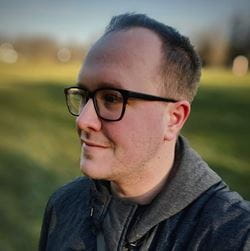
Speaking out to build inclusivity
 by Vitusha Oberoi – Mar 22, 2024
by Vitusha Oberoi – Mar 22, 2024  For Andrew Letchuk (Educational Support ’17), coming to Sheridan helped him open critical conversations on disability, and inspired him to strive towards building a more accessible, barrier-free world that values the identities and perspectives of everyone living with disabilities.
For Andrew Letchuk (Educational Support ’17), coming to Sheridan helped him open critical conversations on disability, and inspired him to strive towards building a more accessible, barrier-free world that values the identities and perspectives of everyone living with disabilities.
For the past three years he’s hosted a podcast called Our Voices: Conversations of Disability, which aims to create awareness about disability justice, intersectionality, ableism, and media representation of people with disabilities. He is also a frequent panelist on discussions around disability and has been a guest speaker educating audiences on myths around disability, sharing his lived experiences and advocating for ways to introduce change for the better.
“My ultimate goal is to create an inclusive barrier-free society that accepts diverse identities,” he says.
Letchuk’s work is driven by his own experience. At the age of eight, he was diagnosed with Asperger’s syndrome. Since then, he has worked to build a path to success, using the different supports available to him to pursue higher education. In addition to his diploma from Sheridan, he also holds a degree in Disabilities Studies from Toronto Metropolitan University and has plans to pursue the Critical Disabilities Studies program at York University.
Letchuk says his success has been built upon his education—right from the early days. At his elementary school in Mississauga, he made friends who were also autistic, some verbal and others non-verbal. He then graduated to a middle school, which had a supportive program, and finally succeeded in completing high school, where he was provided with an individual education plan (IEP) that provided resources he needed to succeed.
“My ultimate goal is to create an inclusive barrier-free society that accepts diverse identities.”
By 2014, Letchuk was looking to explore postsecondary education. He visited Sheridan’s Trafalgar Campus with his teacher and decided to join the Education Support Program which included courses in disability issues and communications disorders.
“The course introduced me to these theoretical frameworks and issues like ableism, eugenics, and stereotypes,” he recalls. “This was something I had lived with my entire life, in a very neurotypical world where you are surrounded by people who are not disabled or autistic. I found it so relatable,” he says.
Initially, Letchuk struggled in the program because starting a conversation with anyone new was nerve-racking for him. He also felt a little overwhelmed by the study load. But he soon found his way forward thanks to the support of his professors. “They knew how to accommodate someone with a disability and they made the lessons more accessible by posting (presentation slides) before the start of the class,” he says.
Letchuk also registered for a number of accessibility services available at Sheridan. “Sometimes I had to take two or three accommodation sheets, because these informed the instructor about my accommodation needs, such as a quiet room to write the exam or extra time for assignments. And I found this to be very helpful. Accessibility has played a pivotal role in my success at school,” he says.
What also helped Letchuk at Sheridan was a summer program which prepared him for the transition from high school to college. He was taught to advocate for himself, how to pay for his food and to take transport. “I learned to take care of things on my own. Accessibility is something I took as my own responsibility, so I wanted to make sure that my professors knew what my needs in the class were,” he says.
Today, as he looks forward, Letchuk sees himself using his Sheridan education as he works toward building a world that is inclusive of everyone.
“It’s a bit of a crossroads because there's so many avenues that I see myself going down. I really have good critical thinking skills, and teamwork skills. So (I’d like to be) either an accessibility consultant specialist or analyzing disability policy or anything pertaining to disability justice, anything I can get involved in.”
Media Contact
For media inquiries, contact Sheridan’s Communications and Public Relations team.


